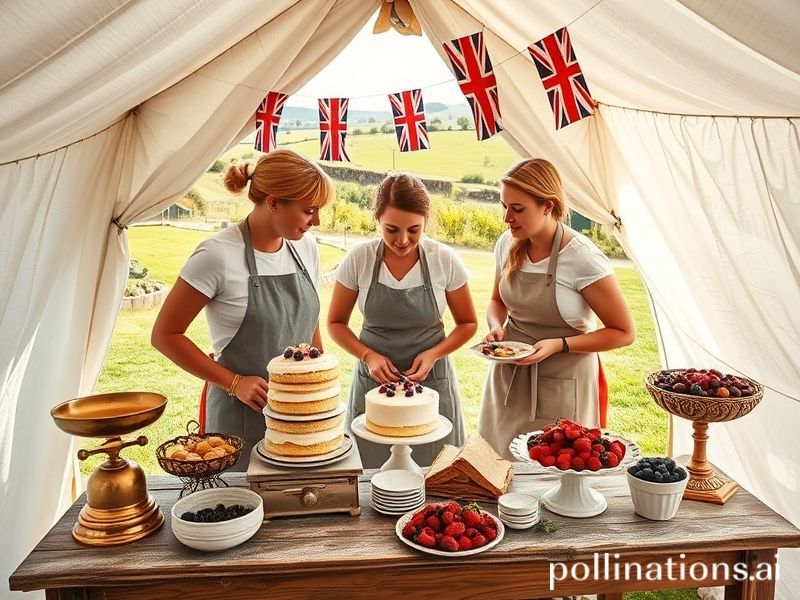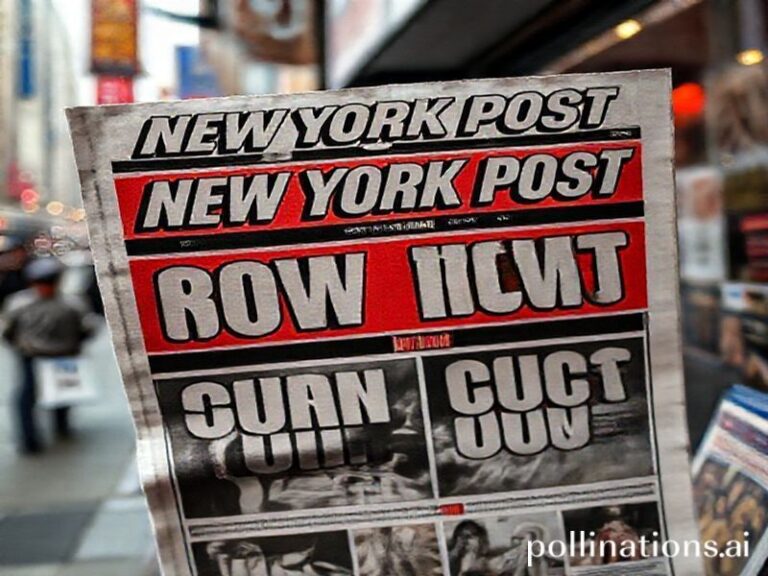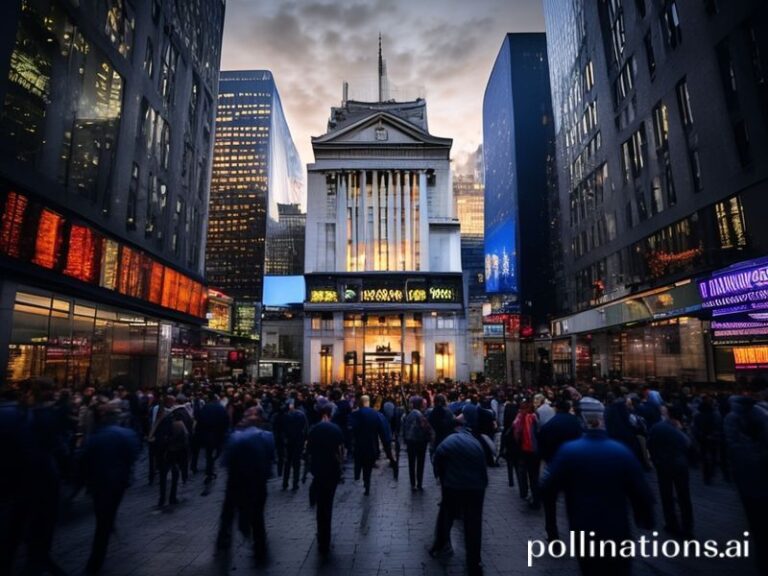Global Anxiety, British Sponge: How The Great British Baking Show Became the World’s Favorite Comfort Blanket Amid Collapse
The Great British Baking Show: A Global Sedative in the Age of Collapse
By Dave’s Locker Foreign Correspondent, still licking marmalade off the keyboard
From the smouldering remains of post-Brexit Britain, a single cultural export has managed to cross more borders than the Queen’s corgis ever did: The Great British Baking Show, known to Americans who refuse to pronounce “scone” correctly as “The Great British Bake-Off.” While the planet warms, supply chains unravel, and democracies flirt with authoritarian pastry chefs, twelve nervous Britons in a marquee tent fret over soggy bottoms as if the fate of the free world hinged on Paul Hollywood’s raised eyebrow. Spoiler: it doesn’t, but pretending it does has become a multibillion-dollar coping mechanism.
Overseas, the program is less a cooking contest than a geopolitical sedative. In 2022, Netflix reported that 73 percent of its non-UK streams occurred within 48 hours of a coup attempt somewhere on Earth. Coincidence? Perhaps. But when tanks rolled toward Burkina Faso’s presidential palace last January, Twitter lit up with GIFs of Prue Leith gasping at an under-proved babka. The UN Security Council may be gridlocked, yet we can all agree that Swiss meringue peaks should be stiff enough to defy gravity and Russian sanctions.
Consider the optics for a moment: a pastel-colored tent erected on manicured English lawns, where contestants apologize for dropping a whisk while wildfires consume half of Greece. The cognitive dissonance is so potent the EU briefly considered classifying each episode as a controlled substance. Brussels bureaucrats ultimately relented when they realized the show’s true utility: soft-power insulation. Every time a French diplomat binge-watches a technical challenge at 3 a.m., Theresa May’s ghost gains another Freddo.
The global franchising—thirty-three licensed versions from Argentina to Uzbekistan—has turned the format into a sort of edible NATO. Contestants in “The Great Australian Bake Off” now fret over lamingtons while debating AUKUS submarine deals off-camera. In “Bake Off Brasil,” tears over curdled brigadeiro mirror the nation’s anguish over deforestation. Even China’s heavily censored edition, “烘焙大师” (Master Baking), replaces political talk with mandatory segments on Xi Jinping Thought fondant toppers. Viewers still cry when the underdog’s soufflé collapses, proving that human disappointment is the last truly universal language.
Economists at the IMF have noted the “Mary Berry Index,” an inverse correlation between national GDP volatility and weekly hashtag traffic about custard consistency. When the Turkish lira plummets, Twitter Turkey pivots to #GbboTurkey faster than you can say “phyllo.” The World Bank now lists “streaming access to gentle baking competition” as a resilience indicator, right next to foreign-currency reserves and literacy rates.
What explains this planetary surrender to sponge cake diplomacy? Simple. The show offers the three commodities most endangered in 2024: predictability, civility, and ovens that actually reach temperature. Contestants hug when they should be filing lawsuits; they share piping bags like Cold-War spies swapping microfilm; they cry, but only out of empathy or over-whipped cream. In a world where your smart fridge can probably stage a coup, watching someone fret over a busted custard is the closest thing we have to group therapy.
Meanwhile, the tent itself has become a pilgrimage site—Stonehenge for the emotionally exhausted. Japanese tourists pay £200 for photo ops beside the proving drawer. Silicon Valley CEOs rent the field for corporate retreats, hoping a laminated dough will teach them what Stanford couldn’t: humility, or at least laminating. Even Ukrainian refugees in Warsaw host communal watch parties, finding temporary asylum in gentle innuendo about “hot baps.”
So what if the planet is on gas mark 9 and rising? At least we can still watch Linda from Sussex rescue her collapsing mille-feuille while the Arctic does the same. The Great British Baking Show isn’t escapism; it’s palliative care with parchment paper. And until someone invents a vaccine for late-stage capitalism, we’ll keep tuning in, clutching our mugs of over-steeped tea, praying the only thing that gets eliminated next week is us—mercifully, by biscuit.







